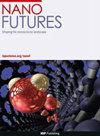In-situ monitoring of plasmon-induced nanoscale photocatalytic activity from Au-decorated TiO2 microflowers
IF 2.5
4区 材料科学
Q3 MATERIALS SCIENCE, MULTIDISCIPLINARY
引用次数: 0
Abstract
Noble-metal-decorated semiconductor photocatalysts have attracted noticeable attention due to their enhanced photocatalytic activity. Herein, we have synthesized the pure rutile phase of TiO2 nanorods, with microflower morphology, using a hydrothermal method and decorated them with Au to observe plasmon-induced enhanced photocatalytic efficiency. The optical bandgap engineering through Au-decorated TiO2 introduces midgap states that help with charge compensation during photodegradation studies. The surface plasmonic resonance peak of Au is observed together with the defect peak of TiO2, extending the absorption of the solar spectrum from the UV to the visible region. The quenching in photoluminescence intensity with increased Au thickness indicates the formation of a Schottky junction at the interface of Au and TiO2 that helps to reduce photogenerated charge carrier recombination. The softening of the E g Raman mode and photothermal effects originate from the nonradiative decay of localized surface plasmons through electron–phonon and phonon–phonon relaxation. The photocatalytic degradation of Rhodamine 6G is monitored by exposing the sample to UV and visible light sources under Raman spectroscopy. The Au decoration plays a crucial role in promoting charge separation, Schottky junction creation, photothermal effects, and UV to visible light absorption to enhance photocatalytic activity, which can be explained on the basis of the charge transfer mechanism. Our in-situ photodegradation study at the interface of noble metal and semiconducting materials will pave the way toward improving the understanding of plasmon-enhanced photocatalytic applications.等离子体诱导的au修饰TiO2微花纳米光催化活性的原位监测
贵金属修饰的半导体光催化剂由于其增强的光催化活性而引起了人们的关注。在此,我们使用水热法合成了具有微流形态的纯金红石相TiO2纳米棒,并用Au对其进行了修饰,以观察等离子体诱导的光催化效率的提高。通过Au修饰的TiO2的光学带隙工程引入了中隙态,这有助于在光降解研究中进行电荷补偿。Au的表面等离子体共振峰与TiO2的缺陷峰一起被观察到,将太阳光谱的吸收从UV扩展到可见光区域。随着Au厚度的增加,光致发光强度的猝灭表明在Au和TiO2的界面处形成了肖特基结,这有助于减少光生电荷载流子复合。E g拉曼模式和光热效应的软化源于局域表面等离子体通过电子-声子和声子-声子弛豫的非辐射衰减。通过在拉曼光谱下将样品暴露于UV和可见光光源来监测罗丹明6G的光催化降解。Au修饰在促进电荷分离、肖特基结形成、光热效应和紫外-可见光吸收以增强光催化活性方面发挥着至关重要的作用,这可以从电荷转移机制的角度来解释。我们在贵金属和半导体材料界面的原位光降解研究将为提高对等离子体增强光催化应用的理解铺平道路。
本文章由计算机程序翻译,如有差异,请以英文原文为准。
求助全文
约1分钟内获得全文
求助全文
来源期刊

Nano Futures
Chemistry-General Chemistry
CiteScore
4.30
自引率
0.00%
发文量
35
期刊介绍:
Nano Futures mission is to reflect the diverse and multidisciplinary field of nanoscience and nanotechnology that now brings together researchers from across physics, chemistry, biomedicine, materials science, engineering and industry.
 求助内容:
求助内容: 应助结果提醒方式:
应助结果提醒方式:


